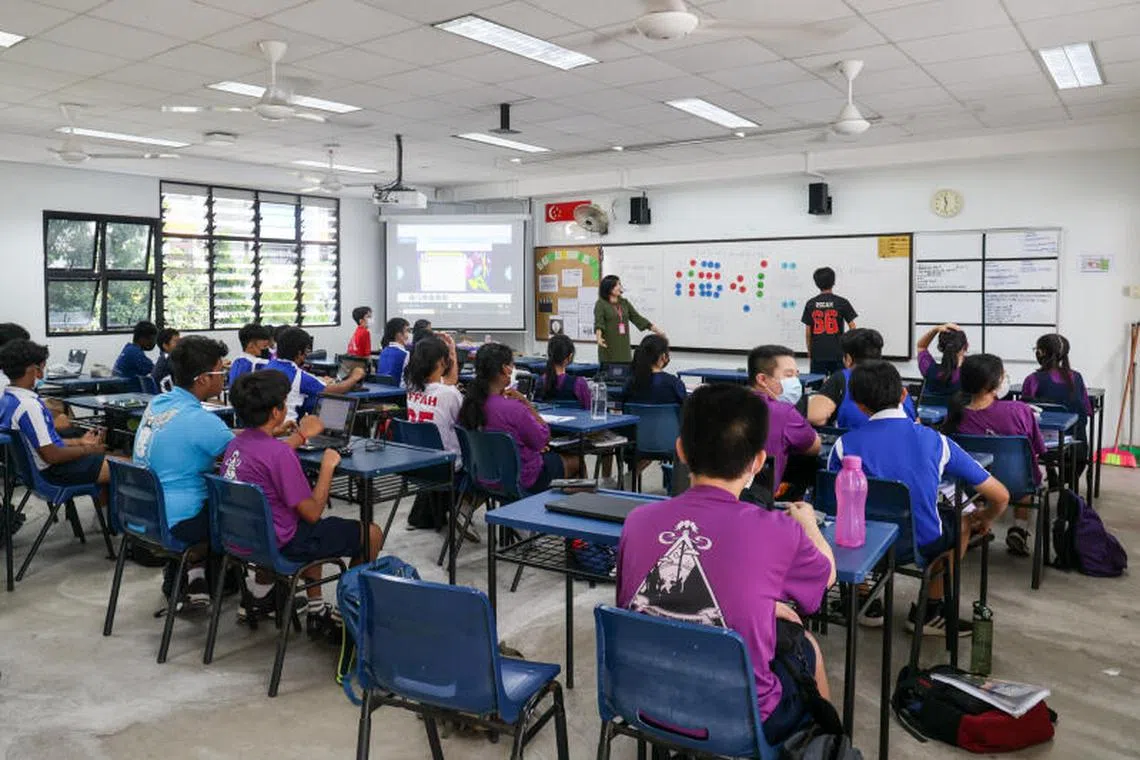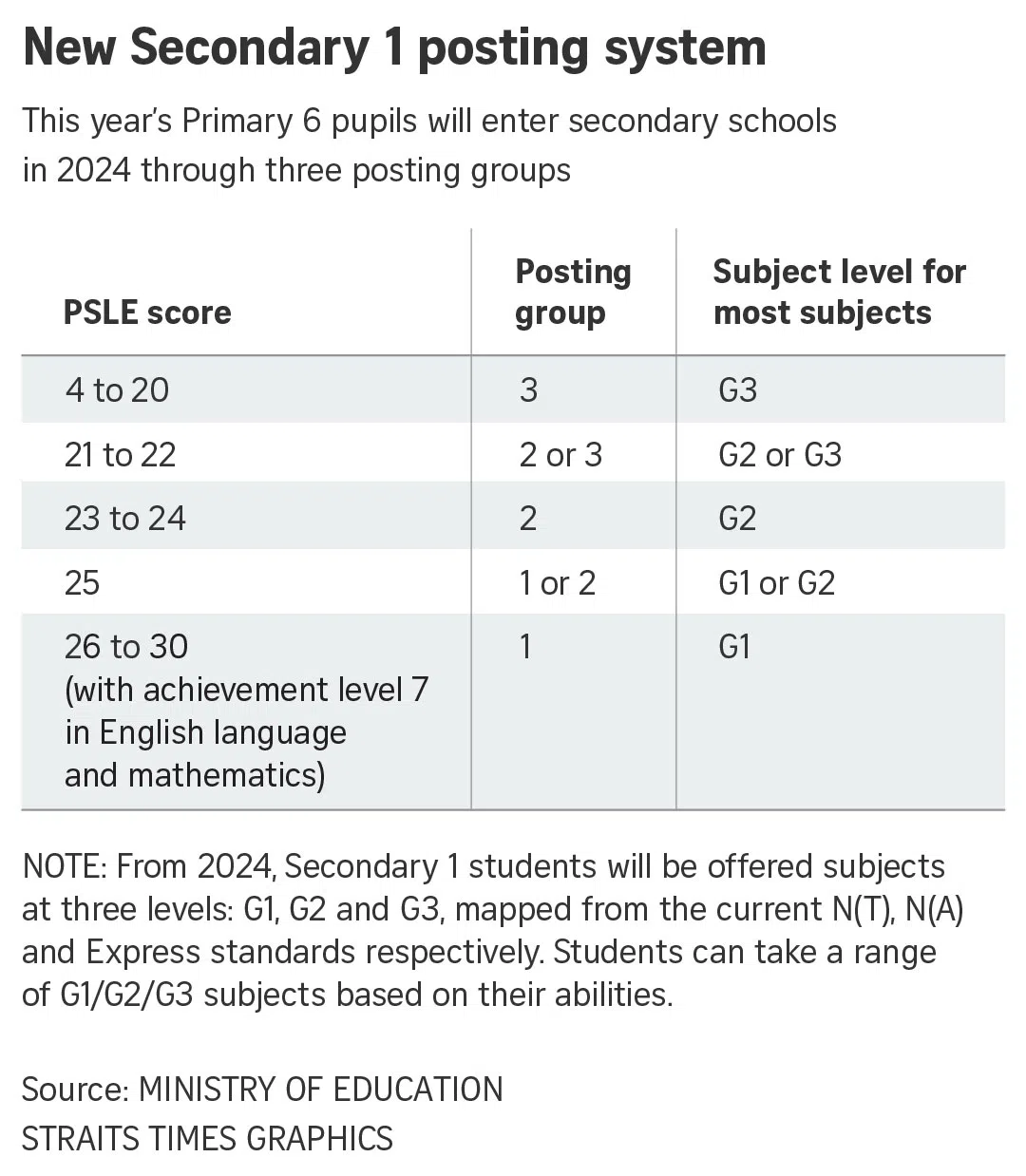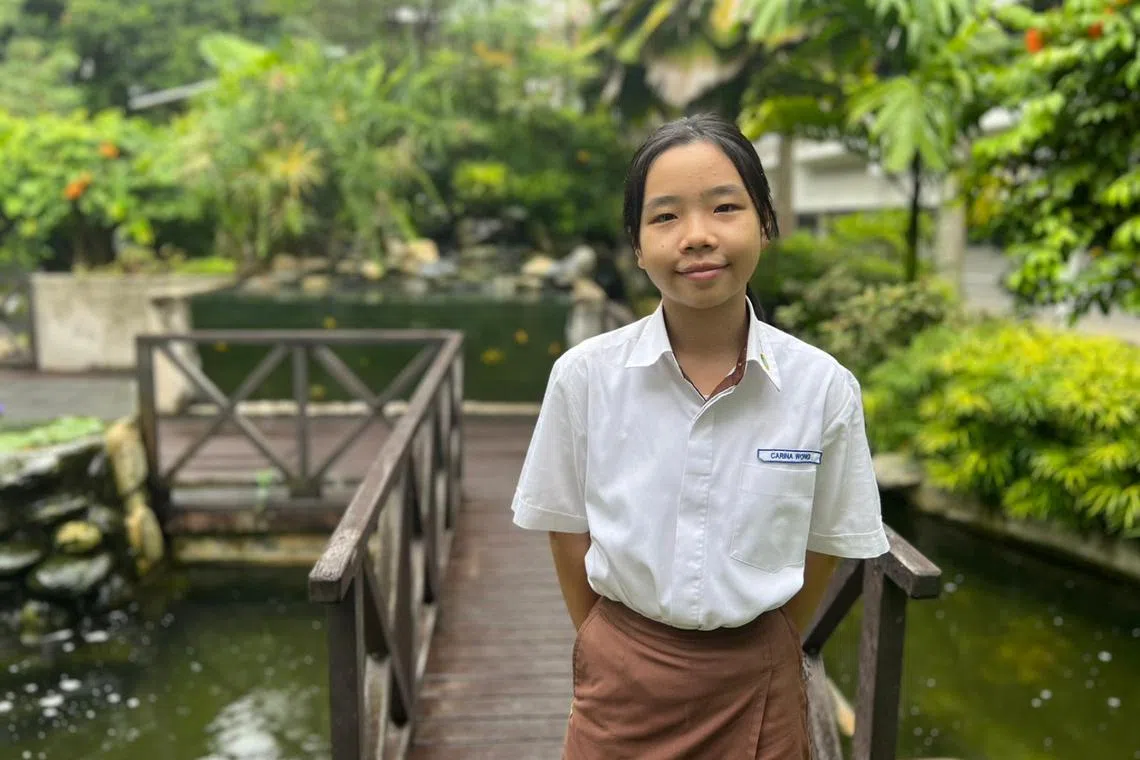Teachers, students adapt to full subject-based banding that caters to diverse interests, strengths
Sign up now: Get ST's newsletters delivered to your inbox

Full subject-based banding will change the educational journeys of students in Singapore, said Education Minister Chan Chun Sing.
PHOTO: LIANHE ZAOBAO
Follow topic:
SINGAPORE – At Bukit View Secondary School, mathematics head of department Irni Karen Mohd Zaini has been juggling timetables.
To accommodate more diverse classes, the school introduced roaming recess periods – where breaks are staggered and vary from day to day – ensuring free periods for self-study, and different end times on different days, she said.
It is one of 120 secondary schools across the island gearing up for full subject-based banding (SBB) in 2024 as Singapore moves to dismantle its academic streaming system, which has stood for more than four decades.
With full SBB in secondary schools, students will have greater flexibility to study more subjects at different levels that suit their interests, aptitudes and learning needs. There will no longer be separate Express, Normal (Academic) and Normal (Technical) stream courses. Students will be in mixed form classes where they can interact with peers with different strengths and interests.
All this requires much planning, as staff have to make sure the school’s canteen can accommodate breaks at different times.
Different end times for classes also have to be considered when planning after-school activities, Madam Irni said. But full SBB is beneficial for students as it gives them ownership and choice in their learning, she added.
“With so many options, our students can truly leverage their strengths and enjoy learning at a pace suited to their needs,” she said.
“Students have shared that they pursue these subjects out of interest and not purely for good grades. This has helped our students manage their workload and assessment demands, allowing them to learn at a comfortable pace.”
Responding to requests for updates on SBB by Mr Baey Yam Keng (Tampines GRC) and Mr Darryl David (Ang Mo Kio GRC), Education Minister Chan Chun Sing on Wednesday described how the policy will change students’ educational journeys.
First, starting with the 2024 Secondary 1 cohort, the Ministry of Education (MOE) will post Primary 6 pupils to secondary schools in three posting groups – 1, 2 and 3 – mapped to the Primary School Leaving Examination score ranges for Normal (Technical), Normal (Academic) and Express courses, respectively.
This is meant to ensure that schools admit students with diverse strengths, and students continue to have access to a wide range of schools, Mr Chan said in Parliament. Schools can also create diversity within classes, with mixed form classes that comprise students offering subjects at different levels.
“Unlike streaming, posting groups will be used only to facilitate admissions and to determine students’ initial subject levels for most subjects at the beginning of Secondary 1,” he said. “Beyond that, posting groups will not shape the secondary school experience.”
Second, under full SBB, eligible students will have the flexibility to take certain subjects at a more demanding level, an option that has been expanded to more subjects, he added.

Some students have also begun to take elective subjects at a less demanding level. “This gives them room to pursue their interests without adding unduly to their overall curriculum load,” said Mr Chan.
Students who want to spend a fifth year in secondary school to take subjects at a more demanding level will continue to be able to do so, he added.
Third, at the end of secondary school, students will receive a common certificate, the Singapore-Cambridge Secondary Education Certificate (SEC), which reflects their different subject combinations and levels.
From 2027, the SEC will replace the separate Singapore-Cambridge General Certificate of Education, for O and N levels.
Mr Chan said transitioning to full SBB will not be straightforward for schools, as teachers will need to get used to managing classes with diverse student profiles, and schools will grapple with practical issues such as timetable scheduling for various subject combinations.
Students will also need to take greater ownership of their learning, he said.
He added that schools offering the Integrated Programme, and specialised schools, will not implement all the features of the full SBB system because they cater to specific student profiles through a whole-school approach.
“Homogenising all our schools for the sake of social mixing alone would come at the expense of our ability to offer mass customisation and differentiated experiences to our students,” he said, pointing out that MOE has sought to enhance diversity in schools by other means.
These include efforts to increase the proportion of students admitted via Direct School Admission (DSA), and broadening the DSA selection process to recognise a range of talents, potential and achievements.
Secondary 4 student Carina Wong told The Straits Times that she had always been passionate about English literature, but was mindful of her academic load when considering her O-level examination subject combinations.

Bukit View Secondary School student Carina Wong is taking English Literature at a less demanding level under the Subject-Based Banding system.
PHOTO: BUKIT VIEW SECONDARY SCHOOL
Being strong in history, she chose that as an elective, but still wanted to take literature at a less demanding level. Carina, a student in the Express stream, is now taking the subject at Normal (Academic) level.
“Taking literature at a less demanding level in upper secondary has allowed me to continue my interest in it,” she said.
She says she finds her study load manageable, and is able to make time for all her subjects.
She added that since the N-level exams are held earlier than the O levels, she will be able to focus more on the rest of her subjects once she is done with her N-level literature paper.

